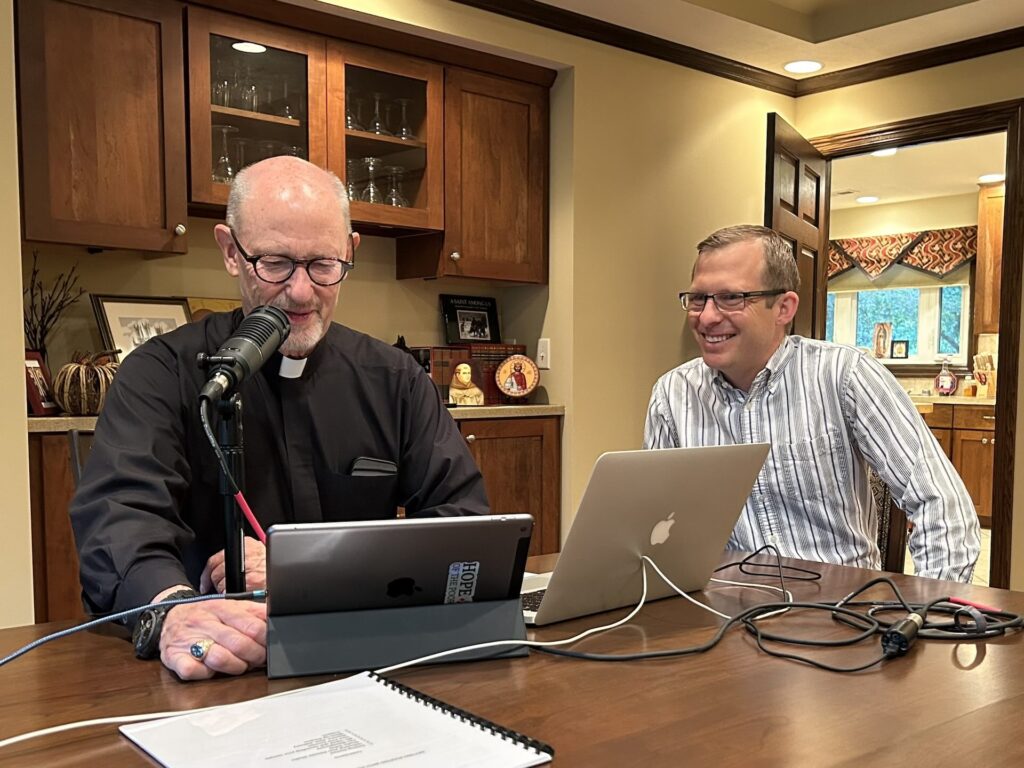A Reading from the Letter of Paul to the Romans
Did that which is good, then, bring death to me? By no means! It was sin, working death in me through what is good, in order that sin might be shown to be sin, and through the commandment might become sinful beyond measure. We know that the law is spiritual; but I am carnal, sold under sin. I do not understand my own actions. For I do not do what I want, but I do the very thing I hate. Now if I do what I do not want, I agree that the law is good. So then it is no longer I that do it, but sin which dwells within me. For I know that nothing good dwells within me, that is, in my flesh. I can will what is right, but I cannot do it. For I do not do the good I want, but the evil I do not want is what I do. Now if I do what I do not want, it is no longer I that do it, but sin which dwells within me.
So I find it to be a law that when I want to do right, evil lies close at hand. For I delight in the law of God, in my inmost self, but I see in my members another law at war with the law of my mind and making me captive to the law of sin which dwells in my members. Wretched man that I am! Who will deliver me from this body of death? Thanks be to God through Jesus Christ our Lord! So then, I of myself serve the law of God with my mind, but with my flesh I serve the law of sin.
Reflection
“I see in my members another law at war with the law of my mind and making me captive to the law of sin which dwells in my members” (Romans 7:23).
St. Paul wrestles with the complexity of his interior life.
Didn’t he commit himself to doing good?
Doesn’t he know better than to do what is wrong?
Of course he knows the right thing to do.
But then why doesn’t he do it?
St. Paul expresses a reality that all of us experience.
There are parts in us that seem to have different thoughts and feelings, different laws that guide their actions, even to the point of being at war within ourselves.
We express this in various ways.
Sometimes we talk about the difference between our minds and our hearts, or we say, “The spirit is willing but the flesh is weak,” or we say, “There is a part of me that wants to watch the TV, but another part of me wants to be faithful to Exodus.”
This experience of different internal parts or sub-personalities has been captured in various psychological models.
In Dr. Sigmund Freud’s well-known id, ego, and superego, or in the popular Pixar movie Inside Out, or in Jordan Peterson’s insights deriving heavily from the work of Karl Jung, we see efforts to capture the inner complexity of our human psyche.
St. Augustine and St. Thomas Aquinas also captured different interior movements as they recognized the ways that our internal senses and our appetites can be at odds with our intellect and memory and cause conflicting pressures for our will.
Psychologists such as Dr. Anna Terruwe and Dr. Conrad Baars derive important insights from these Doctors of the Church in their own psychological models.
The Catholic Church has never chosen a single psychological model, but rather embraces all that is true in the human sciences and, in fact, each model has unique insights to offer.
In the Internal Family Systems (IFS) model, there is a simple conceptualization of the human psyche in terms of sub-personalities, called “parts.”
Furthermore, IFS notes that parts relate to each other in interesting ways.
For example, there are weaker parts that carry burdens that we spontaneously stuff down or “exile.”
Then we tend to post protectors to keep that painful burden from being felt.
The protectors are often pro-active, called “managers” or reactive, called “firefighters.”
Managers try to do everything perfectly so as not to trigger the painful burden.
Perfect performance, foreseeing every detail, and working harder are the realm of managers.
They can also serve as inner critics, noticing what everyone else is (and what they themselves are) doing wrong.
Firefighters try to squelch the pain of an exile’s burden as quickly as possible by acting out.
This can be binging, hiding, blaming, blowing up, or even holy activities like going to Confession right away—anything to stop the pain.
What is the pain we do not want to feel?
Often it is some form of shame—some feeling of inadequacy, insecurity, weakness.
Shame is the fear that if others were to see this part of us they would surely reject us and separate from us.
A part of us feels unworthy of love and belonging.
What we need most is empathy in our vulnerability and shame.
This empathy is needed both from others and from ourselves.
For more on a Catholic approach to IFS see Souls and Hearts.
For more on IFS applications to shame and purity, see Purity is Possible and Optimal Work.




